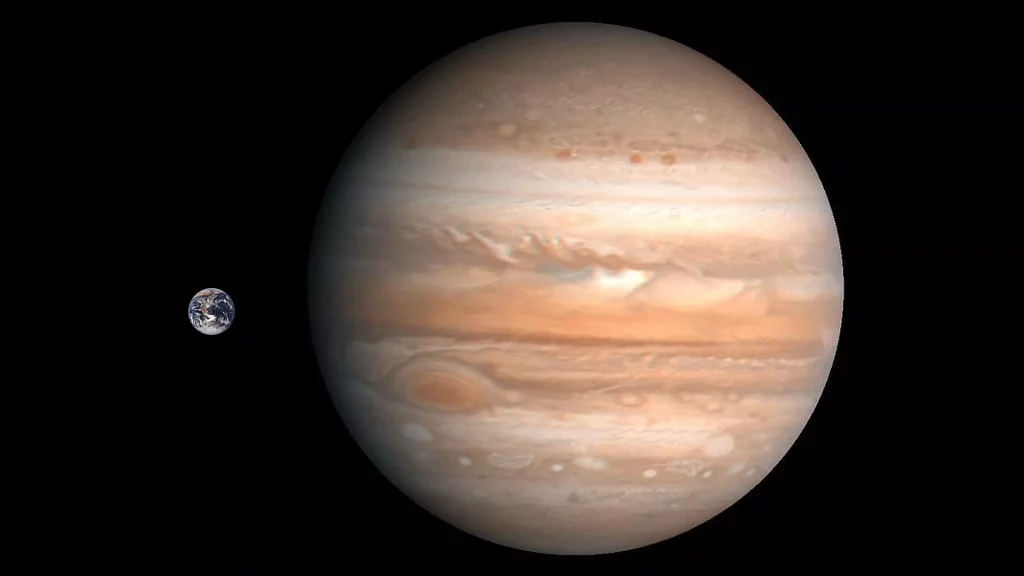
A change in Jupiter’s orbit would make Earth more habitable
New models suggest that the surface of our planet could be more suitable for life if the gas giant, the aforementioned Jupiter, changes its orbit. The study published in Astronomical Journalcould be important in the search for habitable exoplanets.
If our planet is habitable, it is because it fulfills many of the basic factors for the emergence of life. First of all, the Earth is located at a good distance from the Sun to allow liquid water to be present at the surface. It is geologically active and its axis of rotation is quite stable. Finally, we are relatively immune to attacksasteroids. This is partly due to the presence of Jupiter. The giant could have already helped to clean the solar system of this debris, but also made it possible to stabilize the orbits of the inner planets, such as the Earth.
Jupiter’s influence on terrestrial life is such that we believed, until now, that a change in its orbit would have dire consequences for our planet. In fact, everything depends on the change. A new study shows that if a gas giant had an eccentric orbit, life on Earth could do better.
The most unusual Jupiter hypothesis
The study looked at how Jupiter affects Earth’s orbit and axial tilt over time. The Earth has a very circular orbit (almost a perfect circle), while its axial tilt – which generates the seasons – is currently about 23.4 degrees.
However, these factors change little over time, and they underlie the so-called Milankovitch cycle. It is a measure of the total heat received by the Earth’s surface, known as insolation.
Part of the Milankovitch cycle is due to Jupiter’s slight gravitational force. But since Jupiter also has a circular orbit, this is not a significant factor. As part of this study, the researchers created simulated solar systems that include a Jovian orbit of higher eccentricity. They believed that a more exotic Jupiter would make Earth less habitable. They were finally surprised to the contrary.
With an increase in the gravitational influence of Jupiter, the Earth will already have better insolationso some of the coldest parts of our planet may be warming to much milder temperatures.
” Many are convinced that the Earth is an example of a habitable planet and that any change in the orbit of Jupiter can only be harmful to the Earth. ” notes Pam Vervoort, co-author of the study. We show that both hypotheses are false.. »
On the contrary, other changes can be disastrous. The researchers found that if Jupiter were too close to the sun, it could cause an extreme tilt on Earth. As a result, our planet will receive less sunlight, which means that large areas on Earth will experience subzero temperatures.
exoplanet research
These results do not concern us directly. According to the latest news, Jupiter is not expected to change its orbit. On the other hand, researchers believe that this study can help astronomers identify potentially habitable exoplanets.
Currently, the search for habitability depends on whether the planet is in the region allowing liquid water to be present at the surface. This is an important parameter, of course, but it is another parameter, like Tropical shape or seasonal changes – She also plays a major role.
As a reminder, planets with more circular orbits maintain a constant distance from their star while more unusual orbits bring planets closer to their stars at different points in that orbit. However, the proximity of the star determines the amount of radiation it receives and the way it is transmitted, which means that it affects the planet’s climate.
Current telescopes are powerful enough to determine the eccentric eccentricity of the orbits of the exoplanets. On the other hand, they are not sufficiently equipped to measure the inclination of these worlds. However, astronomers can work on indirect methods — such as examining the orbits and motions of nearby gas giants — to determine this.

“Incurable web evangelist. Hipster-friendly gamer. Award-winning entrepreneur. Falls down a lot.”
